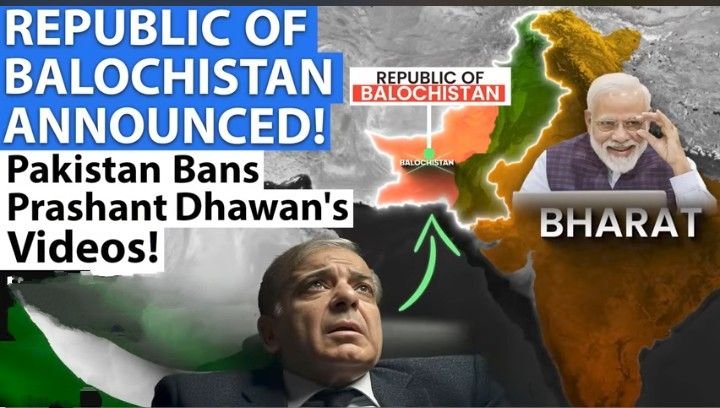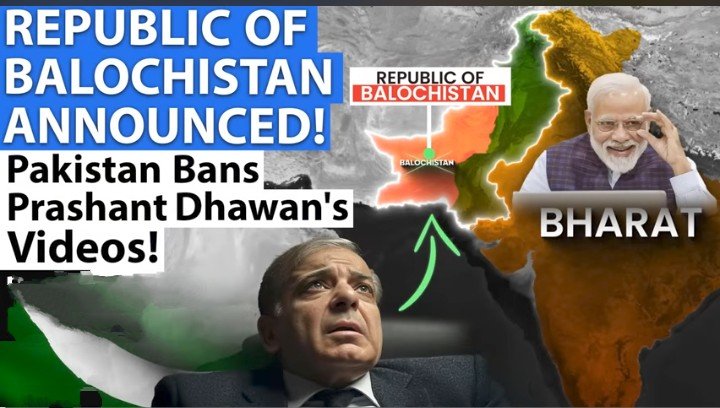DECLARED | Pakistan has Banned

India, Balochistan, and the Shifting Geo-Political Landscape: A Call for Strategic Support
In a time of heightened tensions between India and Pakistan, a significant shift is taking place in the geopolitical sphere — the call for an independent Republic of Balochistan. As both nations have expelled each other’s High Commissioners, a louder voice is emerging from Baloch activists urging India to formally support their movement. Social media is witnessing a surge in the phrase “Republic of Balochistan,” with many Baloch leaders demanding diplomatic recognition from India.
Panic in Pakistan: Suppression of Indian Voices
Recently, YouTuber Prashant Dhawan revealed that the Pakistani government has started targeting Indian content creators who publish credible information about internal matters in Pakistan. Videos covering incidents like fighter jet crashes or military base damage are being flagged and banned. According to Dhawan, this suppression is not due to propaganda but because of the credibility such channels carry — content based on facts and analysis, not sensationalism.
The Pakistani government, fearing global embarrassment, is clamping down on voices that expose the truth. However, they continue to ignore creators who peddle exaggerated claims, indicating that the issue lies with the truth-tellers, not troublemakers.
The Rise of the Baloch Freedom Movement
Balochistan, Pakistan’s largest province by land area, has long harbored separatist sentiments. For decades, the region has suffered from neglect, underdevelopment, and military crackdowns. Now, prominent Baloch activists, including Meer Yaar Baloch, have declared complete independence from Pakistan. On May 9, 2025, this declaration gained traction online, with strong messages of solidarity being sent toward India.
Meer Yaar Baloch is not just an activist but also a prominent writer advocating for Baloch rights. She, along with others, is calling on India to take a bold step: open an official “Republic of Balochistan” office in New Delhi. This move, they believe, would be the first concrete step toward international recognition of their cause.
Map Controversies and Geopolitical Sensitivities
A major challenge in recognizing Balochistan lies in its territorial claims. Maps floating online often show an expansive Baloch homeland that includes parts of Iran and Afghanistan. Such representations can complicate India’s support, as these neighboring countries may object to perceived threats to their sovereignty.
The pragmatic path forward would be for Baloch leaders to define a clear, limited map — one that aligns with the current borders of Pakistani Balochistan. This clarity would prevent Pakistan from rallying regional opposition by portraying the movement as a threat to broader regional stability.
What Are Baloch Activists Demanding?
- Recognition of Balochistan’s independence by India and international bodies like the United Nations.
- Establishment of a Balochistan office or embassy in New Delhi, similar to the way Taiwan maintains a cultural and trade office despite not having full diplomatic recognition.
- UN peacekeeping presence in Balochistan and acknowledgment of its democratic government.
While these demands may currently face resistance — particularly due to China’s and the USA’s influence in the UN — the conversation has begun. India’s response could influence how other nations perceive the movement. Countries like Armenia and Israel, both wary of Pakistan’s alliances and activities, might follow India’s lead if it chooses to recognize Baloch aspirations.
India’s Strategic Choices Ahead
Supporting the Republic of Balochistan is not about immediate recognition, but initiating the conversation. A cautious but deliberate step — such as allowing a cultural or advocacy office in Delhi — could be the diplomatic spark needed to push the Baloch cause into international discourse.
India must also consider regional dynamics. Iran and Afghanistan should be engaged diplomatically to ensure that the Baloch movement does not disrupt relations or infringe upon their sovereignty. Clarifying Balochistan’s boundaries and intentions is critical to avoiding further geopolitical friction.
Conclusion: From Concept to Country
Balochistan today is where Bangladesh once was — a concept, an idea for freedom. Bangladesh was once just a file on a desk. Today, it’s a sovereign nation. The future of Balochistan may follow a similar path.
The key question is: When will it happen?
India, having a history of supporting oppressed ethnic groups, must now weigh its options carefully. Opening a dialogue, taking symbolic steps, and showing solidarity could lay the foundation for a freer South Asia — one where the aspirations of millions of Baloch people finally find a voice on the global stage.
